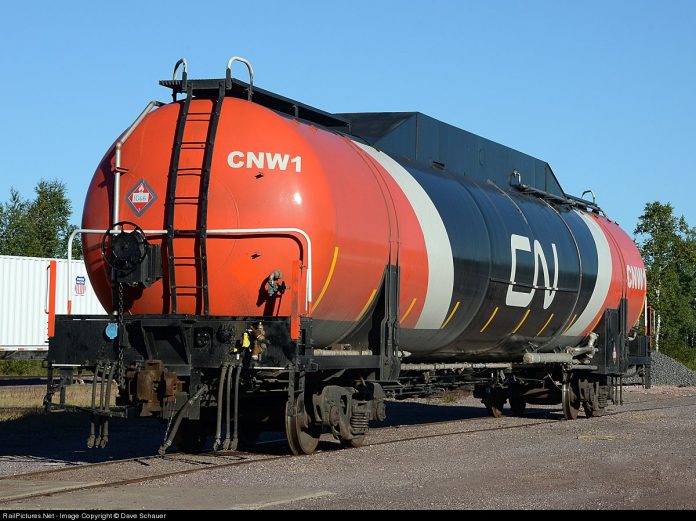The attorneys general (AGs) of 25 states sent a letter requesting the U.S. Department of Transportation’s Pipeline and Hazardous Materials Safety Administration (PHMSA) reconsider its new rule banning the transport of liquified natural gas (LNG) via rail tank car.
The new rule reverses a 2020 Trump administration amendment to federal hazardous materials regulations that allowed the transport of LNG by a special class of rail tank car.
The Trump rule was designed to speed and ease delivery of LNG to communities without suitable pipeline infrastructure in place.
Proven Safety Record Cited
When the early-2020 amendment was adopted, the PHMSA stated the transport of LNG is safe in tank cars with enhanced puncture resistance.
The agency noted DOT-113 tank cars have been shown to be safe for carrying cryogenic materials.
“[W]e have determined that bulk rail transport is a safe alternative for this energy product.” The PHMSA wrote in the amended rule.
Biden Reversed Course
To comply with President Joe Biden’s Executive Order 13990, “Protecting Public Health and the Environment and Restoring Science to Tackle the Climate Crisis,” the PHMSA reversed course, citing concerns about safety and climate change.
In the letter to PHMSA Acting Administrator Tristan Brown, Louisiana Attorney General Jeff Landry noted worries about natural gas’ contribution to climate change or its effects are outside the scope of the PHMSA’s charter.
“Moreover, the general concern that transporting LNG by rail might result in an increase in production of natural gas which might result in an increase in greenhouse gases … is an attenuated and speculative concern untethered to the scope of PHMSA’s regulatory purpose,” Landry said. “Current geopolitical events involving Russia’s unprovoked attack on Ukraine show with painful clarity the need for the United States to maintain its energy independence through multiple distribution points throughout our country.
“The agency should not move forward with suspension of a rule that serves that important objective,” the AGs’ letter said.
‘Nothing Short of Detrimental’
The Biden administration has been hostile toward American production of oil and gas from the beginning, and its policies are harming average Americans, says Mike Moncla, president of the Louisiana Oil and Gas Association.
“The Biden administration has been nothing short of detrimental to our industry in every way possible.” Moncla said. “Not only does this administration not want oil or natural gas delivered by pipeline, they don’t want it by rail, either. The administration is doing everything it can to hurt the oil and gas industry.
“There are parts of this country in need of affordable, abundant, and reliable energy, and there is a way to get it to places where pipelines aren’t accessible, so why would this administration want to hinder American citizens with higher energy prices?” Moncla said.
‘Next Best Way’
Transporting LNG by rail is the safest method after pipelines, which the environmental Left is also trying to eliminate, says Tim Benson, a senior policy analyst with The Heartland Institute, which co-publishes Environment & Climate News.
“Natural gas is the largest source of electricity generation in the country,” Benson said. “It does not just magically arrive at power plants after being drilled out of the ground. It has to be transported there somehow. The best, safest, easiest, and cheapest way to get it from well to plant is via pipelines, but since the word ‘pipeline’ sends Democrats and radical environmentalists into a hysterical fit and they seek to block any new pipeline infrastructure project, the next best way to transport it is by rail.”
Trains are not as safe as pipelines for transporting LNG, and they are probably more expensive, but the current pipeline system cannot serve all customers as needed, says Benson.
“Trains don’t have the safety record pipelines do, and rising transportation fuel prices mean it will cost more to ship LNG across the country, making other goods and services more expensive for families, but our current pipeline network is inadequate to meet demand, so trains will have to do for now.” Benson said.
‘Thumb on the Scale’
The Biden administration’s actions represent intentional efforts to destroy the economic viability of natural gas as an energy source, says Benson.
“The Biden administration is trying to make it impossible, on environmental grounds, to transport LNG via rail,” Benson said. “It sure seems like the Biden administration is putting its thumb on the scale to encumber the natural gas industry and make LNG as unviable as possible as a means of generation in the future.
“As altruistic and forward-thinking as this administration tries to pretend it is, Louisiana AG Landry is correct when he says the Biden war on fossil fuels is a war on America’s poor and working classes,” Benson said. “There is no other way to interpret this decision.”
In addition to Landry, the attorneys general of Alabama, Alaska, Arizona, Arkansas, Florida, Georgia, Louisiana, Indiana, Kansas, Kentucky, Mississippi, Missouri, Montana, Nebraska, New Hampshire, Ohio, Oklahoma, South Carolina, South Dakota, Texas, Utah, Virginia, West Virginia, and Wyoming signed the February 28 letter requesting the PHMSA not adopt a final rule suspending LNG transport by rail.
Linnea Lueken (llueken@heartland.org) is a research fellow with the Arthur B. Robinson Center on Climate and Environmental Policy at The Heartland Institute.
Internet Info:
Louisiana Attorney General Jeff Landry et al., Letter requesting the Biden administration reinstate the rule allowing LNG transport by rail, February 28, 2022: https://agjefflandry.com/Files/Article/13010/Documents/PHMSAComment-FINAL.pdf

























